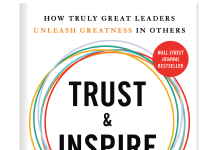By Mary Hladio, Founder and CEO, Ember Carriers Leadership Group
Most midsize company owners have been able to successfully run their businesses while acting as both player and coach. However, they will find it becomes nearly impossible to grow their business while remaining intimately involved in calling the shots and making the plays every day. As a business owner, making the permanent transition from star player to coach and building a highly functional and effective team is one of the best things you can do to help grow your company long term. It is important to surround yourself with people who can help you run the company, meet your customer expectations, and hit your performance targets while freeing you up to act strategically.
Many company owners talk about their efforts to build a strong staff in terms of teambuilding activities, clarifying roles and responsibilities, or providing training programs—all these things can contribute to a team’s overall effectiveness. However, these are just a few plays in the playbook. You need employees who will be dedicated and invested in the growth of your company long term. Building a strong team starts with talent—identifying, attracting, and deploying the right players to achieve your company’s goals and take on your mid-level responsibilities, thereby freeing you up to focus on your company’s performance and sustainability.
But what actions do you need to take to build the core strengths of your future star players that will allow them to step into the leadership roles your company needs? Your highly functional team is not successful if they cannot assist you. A useful starting point for any company owner who intends to build a strong leadership team is to consider two fundamental questions. Start by asking:
- Where should I be spending my time? Or what should I be doing that will add the greatest value to my business?
- What set of skills and expertise do I need on my team to allow me to delegate day-to-day responsibilities and focus my efforts on strategic long-term growth?
In the beginning stages of building your leadership team, you want to make sure you seek employees who will complement your company’s mission, vision, and core values. By developing employees whose vision mirrors your own, you are making a worthwhile investment in your company. The first thing you need to look at is yourself—but be honest. Taking the time to determine your strengths, your weaknesses, and your leadership type will help you choose the right people to complement you. Consider this the team tryout. Don’t keep players you never see leaving the bench.
Next, evaluate and measure your company’s existing employees to identify those with the greatest potential for growth. Who are the employees who are willing and able to take on your day-to-day responsibilities and complement your weaknesses? If you took the time and effort to develop them, could they step into a leadership role? Again, this is a time to be brutally honest with yourself and your employees. And if you find the needed skills cannot be developed, your next option is to identify and attract the required talent from outside the company.
Lastly, develop these key employees identified into a leadership team that can run the day-to-day operations of your company, make tactical decisions, and free you to focus on your company’s long-term growth and sustainability. Work with your team to establish specific and measurable goals for them that maximize your strengths as a company owner. Start involving them in discussions about basic business and industry acumen, and skills that shore up your weaknesses and fill the gaps that stand in the way of achieving your company’s mission and vision.
In the end, you will have a group of leaders invested in making your company more successful. Most importantly, you will have the time, opportunity, and resources that allow you to focus on your role as a strategic coach and leave the rest up to the team.
Mary Hladio is the founder and CEO of Ember Carriers Leadership Group, which provides leadership development for managers and executives. For more information, visit http://www.embercarriers.com.




